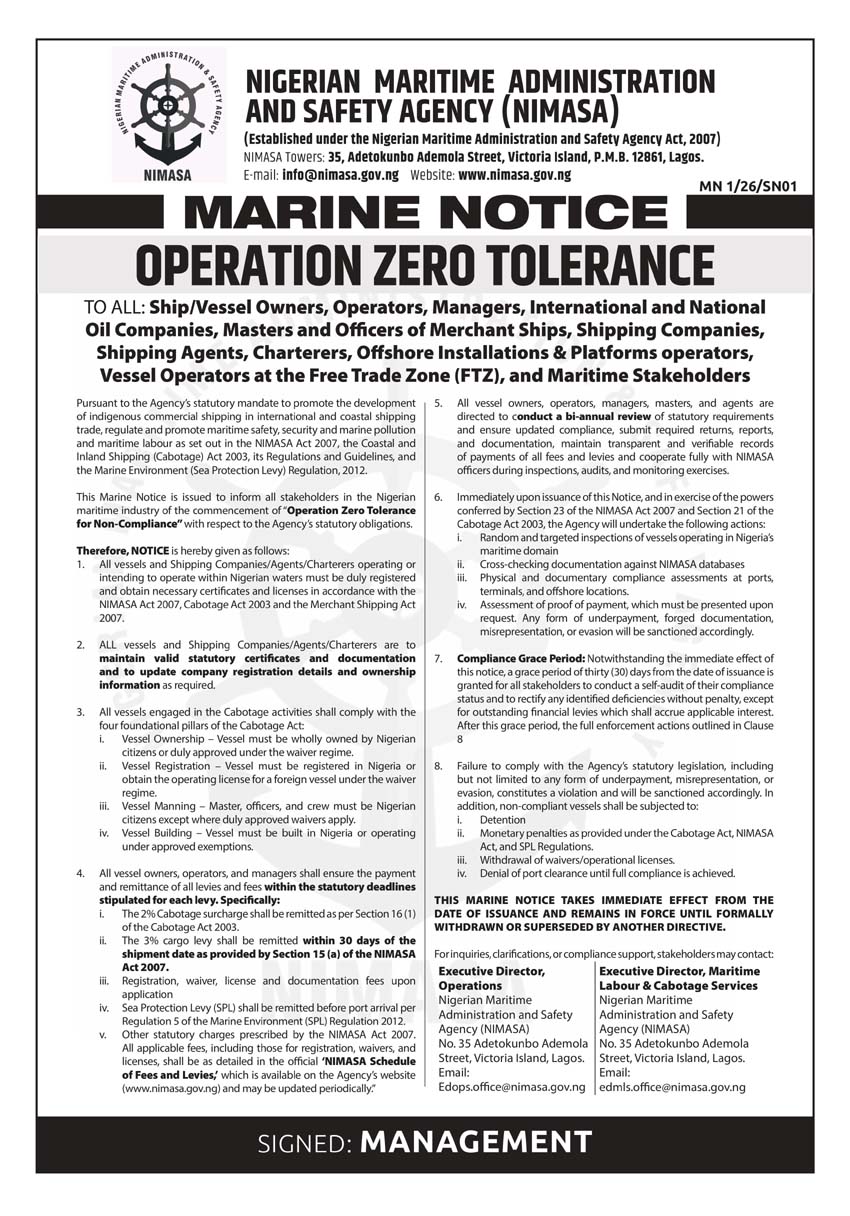• Says Only 22 Port Facilities Are Compliant
After almost one year of diplomatic ding-dong over implementation of the all-important International Ships and Port Facility Security (ISPS) Code, the U.S. Government yesterday wield the big stick on Nigeria, imposing what it called “Conditions of Entry (COE)’’ on vessels originating or calling from the nation’s seaports.
• Says Only 22 Port Facilities Are Compliant
After almost one year of diplomatic ding-dong over implementation of the all-important International Ships and Port Facility Security (ISPS) Code, the U.S. Government yesterday wield the big stick on Nigeria, imposing what it called “Conditions of Entry (COE)’’ on vessels originating or calling from the nation’s seaports.
In what is an apparent categorization of Nigerian ports as non-compliant with the dictates of the ISPS Code, the U.S. Mission in Nigeria said in a statement, that it was henceforth, required that Nigerian vessels met certain security measures before entering U.S. ports.
The statement said that only 22 Nigerian port facilities in some unidentified ports would be exempted from the COE.
The statement said:“The United States Government has imposed Conditions of Entry on vessels originating or calling from Nigerian ports.
“This requires these Nigerian vessels to meet certain security measures prior to entering U.S. ports.
“ Twenty two port facilities in Nigeria are however, exempted from the COE as they have been found to have adequate security measures in place,’’ it said.
The statement said that the 22 port facilities had demonstrated effective anti-terrorism measures and would no longer be subjected to additional security precautions.
It, however, said that the COE was not meant as trade sanctions or ban on Nigerian ships from entering U.S. ports.
The statement added that COE was also to make Nigerian ships to have additional security measures while non-exempt Nigerian port facilities were to be verified by the U.S. Coast Guard.
It added that:“The U.S. Coast Guard has worked cooperatively with the Government of Nigeria to identify and address port security deficiencies observed during the assessments.
“Nigerian ports have not fully implemented the provisions of the International Ship and Port Security (ISPS) Code and do not have effective anti-terrorism measures in place.
“Only 22 Nigerian port facilities have demonstrated effective anti-terrorism measures and will not be subject to additional security precautions”.
The statement said that the U.S. Coast Guard would continue to consult with the Nigerian Government in achieving full ISPS Code compliance and removal of the COE.
Prior to yesterday’s verdict, officials of the United States Coast Guard had visited Nigeria’s seaports a couple of times, to check whether their operational procedures are in tandem with the International Ship and Port Facility Security (ISPS) Code.
The code is a comprehensive set of measures to enhance the security of ships and port facilities, developed in response to the perceived threats to ships and port facilities in the wake of the September 11, 2001 terrorists’ attacks on the United States.
The ISPS Code is meant to reduce the vulnerability of the industry to attacks, thus countering threat and reducing risks.
The US Coast Guard had on its first visit indicted the Nigerian government over the confusion at the nation’s ports, especially over which agency has the authority to implement the ISPS Code in the country among the various government agencies.
The US had before the visit of its coast guard, given Nigeria 90 days ultimatum on port security
The team came on 26th of August, 2013.
On the strength of the threat by US to ban ships to and from Nigeria into her ports due to non-compliance to the ISPS Code, the Federal Government hurriedly confer the status of implementing agency on NIMASA.
Series of meeting were held between NIMASA and officials of the US Coast Guard to ensure compliance.














Discussion about this post